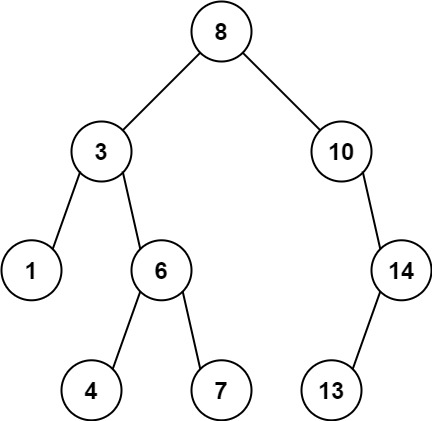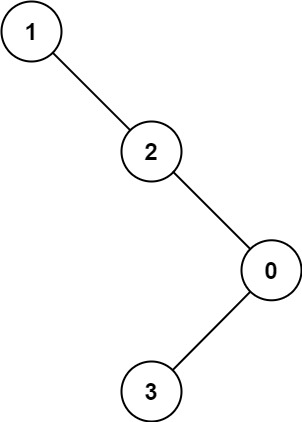Problem
Given the root of a binary tree, find the maximum value v for which there exist different nodes a and b where v = |a.val - b.val| and a is an ancestor of b.
A node a is an ancestor of b if either: any child of a is equal to b or any child of a is an ancestor of b.
Example 1:

Input: root = [8,3,10,1,6,null,14,null,null,4,7,13]
Output: 7
Explanation: We have various ancestor-node differences, some of which are given below :
|8 - 3| = 5
|3 - 7| = 4
|8 - 1| = 7
|10 - 13| = 3
Among all possible differences, the maximum value of 7 is obtained by |8 - 1| = 7.
Example 2:

Input: root = [1,null,2,null,0,3]
Output: 3
Constraints:
The number of nodes in the tree is in the range
[2, 5000].0 <= Node.val <= 10^5
Solution (Java)
/**
* Definition for a binary tree node.
* public class TreeNode {
* int val;
* TreeNode left;
* TreeNode right;
* TreeNode() {}
* TreeNode(int val) { this.val = val; }
* TreeNode(int val, TreeNode left, TreeNode right) {
* this.val = val;
* this.left = left;
* this.right = right;
* }
* }
*/
class Solution {
private int max = 0;
public int maxAncestorDiff(TreeNode root) {
traverse(root, -1, -1);
return max;
}
private void traverse(TreeNode root, int maxAncestor, int minAncestor) {
if (root == null) {
return;
}
if (maxAncestor == -1) {
traverse(root.left, root.val, root.val);
traverse(root.right, root.val, root.val);
}
if (maxAncestor != -1) {
max = Math.max(max, Math.abs(maxAncestor - root.val));
max = Math.max(max, Math.abs(minAncestor - root.val));
traverse(root.left, Math.max(root.val, maxAncestor), Math.min(root.val, minAncestor));
traverse(root.right, Math.max(root.val, maxAncestor), Math.min(root.val, minAncestor));
}
}
}
Explain:
nope.
Complexity:
- Time complexity : O(n).
- Space complexity : O(n).